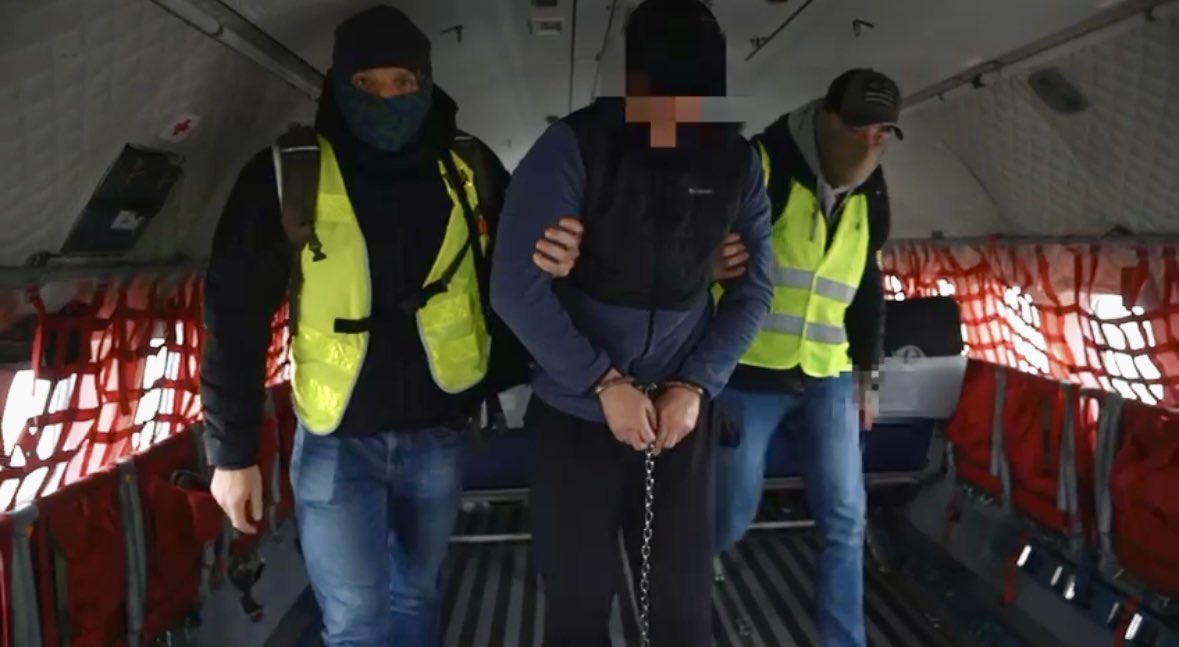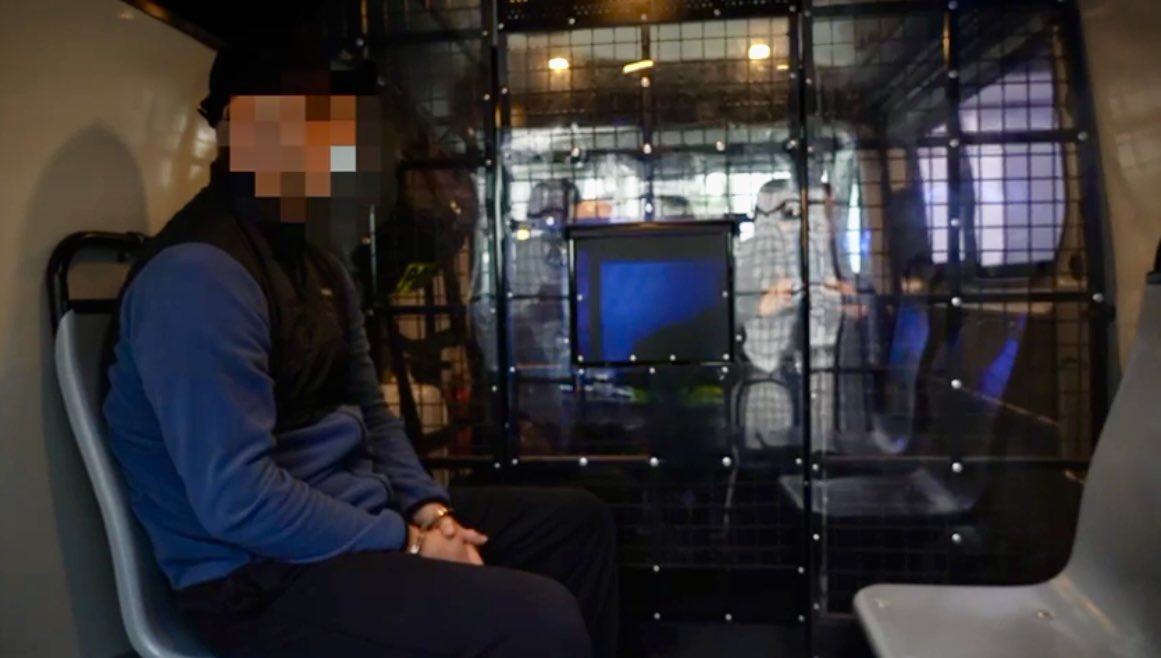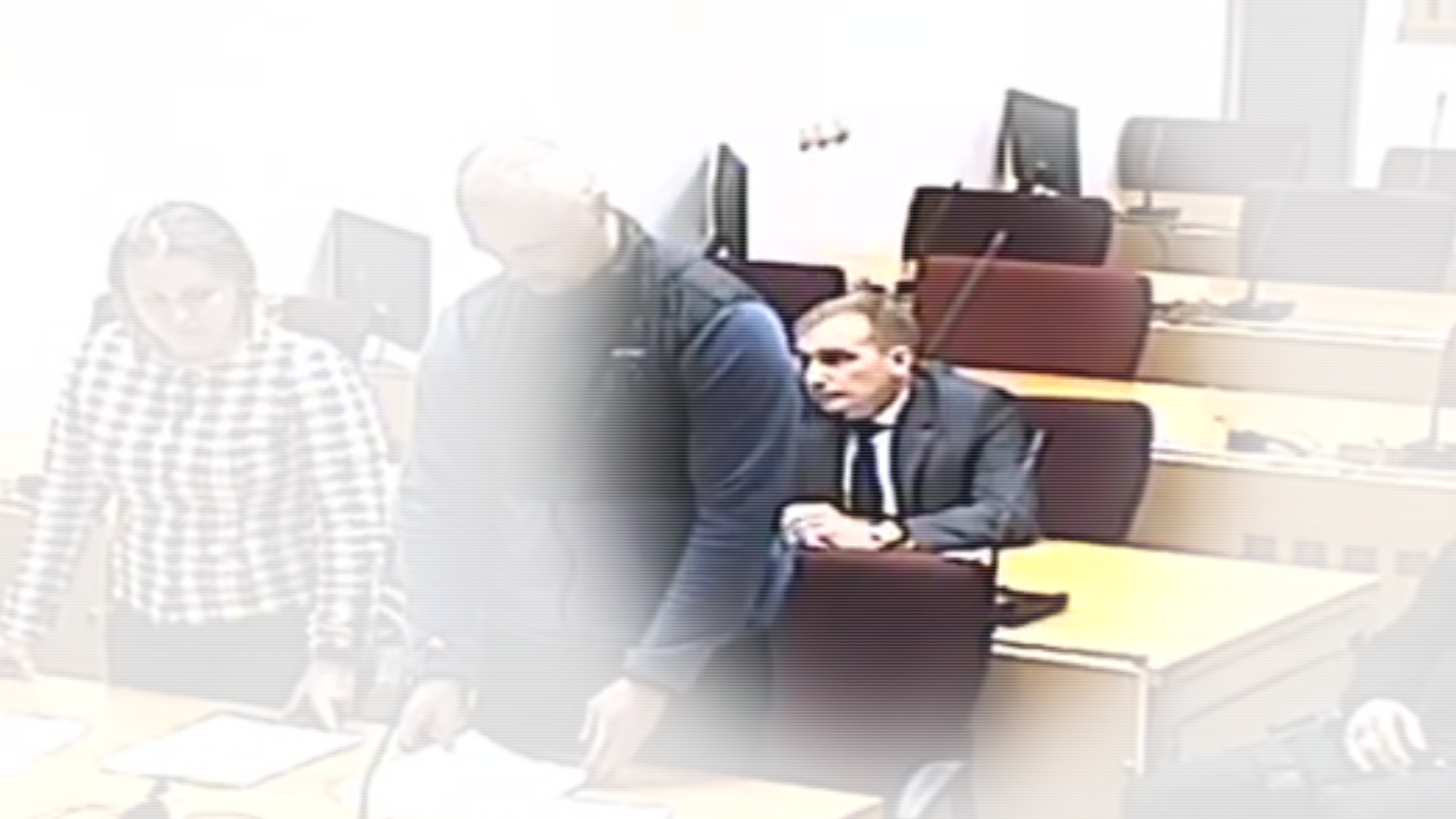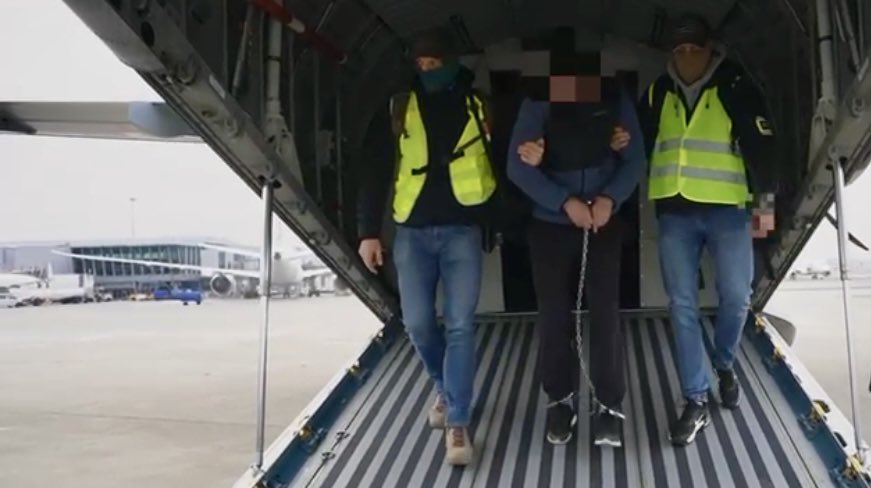This post is also available in: Bosnian
The man booked for two, but arrived alone, at midday on November 14, 2024.
It was his second stay that year at the family-run guesthouse in Bosanska Krupa, a town on the Una River in northwestern Bosnia and Herzegovina, not far from the border with Croatia and the European Union.
The next day, after dark, the police arrived. Sabina Besic Lips’s parents were in their apartment on the first floor.
“Suddenly, the whole house was illuminated,” said Besic Lips, who owns the guesthouse but lives in Germany. “The police or some special unit flashed lights at the house, and then my father went out onto the balcony, and they told him to stay quiet and to open the door, which he did.”
The police charged up the stairs and arrested the man, acting on an Interpol ‘red notice’ issued at the request of Poland roughly three months earlier. They had netted one of Europe’s most wanted fugitives.

Polish police officers escort Bezrukavyi from a plane after landing in Poland in February 2025. Photo: X/Jacek Dobrzyński, media spokesman for the Minister for the Coordination of Special Services.
Poljski policijski službenici izvode Bezrukavyija iz aviona nakon slijetanja u Poljsku u februaru 2025. godine. Foto: X/Jacek Dobrzyński, portparol za medije ministra koordinatora specijalnih službi.
Russian Aleksandr Bezrukavyi, 44, was wanted on suspicion of coordinating acts of sabotage against Poland, the United States and others, allegedly acting on the orders of Russian intelligence services.
In July 2024, parcels exploded at logistics depots in Britain, Germany and Poland; security officials at the time said they were likely part of a test run for a plot to trigger explosions on cargo flights to the US. Bezrukavyi’s arrest and extradition three months later to Poland was hailed by the government in Warsaw as “a serious blow to the Russian sabotage network in Europe”.
Amid continuing questions about how Bezrukavyi was able to slip in and out of Bosnia and what he did while he was there, international relations professor Adnan Huskic said it was possible he had been under surveillance the whole time.
“Not wanting to absolve anyone of responsibility, it is quite possible that in this case, surveillance was carried out in cooperation with Western intelligence agencies, and that information about it was available to a very limited circle of people,” Huskic said, citing the risk of a leak from certain Bosnian Serb officials known to enjoy close ties with Russia.
Phones, chargers and 1,300 euros in cash
Speaking on condition of anonymity, intelligence sources in Bosnia said Bezrukavyi first arrived in Bosnia by plane, landing at Sarajevo airport in February last year and entering the country legally.
Besic Lips said he booked the apartment in Bosanska Krupa via Booking.com. He arrived on foot, which Besic Lips’s parents found “strange”, she said, “but they thought maybe he was a foreigner who knew some of the locals, who maybe dropped him there to stay the night”.
He stayed two days. “He spent the entire time in the apartment,” Besic Lips said. “I don’t think he even went out anywhere.”

Aleksandr Bezrukavyi in a Polish military plane. Photo: X/Jacek Dobrzyński, press spokesman for the Minister for the Coordination of Special Services
On the second day, Bezrukavyi asked for a lift to a forest in Ivanjska, right on the border with Croatia and a well-trodden route for migrants and refugees trying to enter the EU. Happy for the extra cash, Besic Lips’s brother obliged, and her father went along too.
According to sources within European security circles, Bezrukavyi crossed the border illegally and proceeded to the Croatian capital, Zagreb, where he spent a night in a private apartment with a Ukrainian friend. From Croatia, he went to Spain, where, according to media reports, he married, secured an EU residency permit, and went to Poland.
Bezrukavyi also spent time in Serbia, before in mid-November 2024, according to security and intelligence sources, he returned to Bosnia, crossing illegally from Croatia. This time he contacted Besic Lips via WhatsApp to book the same apartment in Bosanska Krupa.
According to extradition papers, when he was arrested Bezrukavyi was found in possession of a Spanish residence permit, two iPhones, four chargers, 1,300 euros in 100-euro banknotes, and an unwrapped Vodafone SIM card.
The phone number he used to book the apartment, as well as to make reservations in Zagreb, was Ukrainian and remains active.
When BIRN messaged the number via Telegram, the user denied knowing Bezrukavyi; BIRN called the number and a male voice answered but hung up as soon as he heard that it was a journalist calling.
The number was previously registered on Telegram as ‘FromSibirwithlove’ until March 2022, when the username changed to ‘Alexey_exchange’. The number is a member of several Telegram groups, including one gathering Ukrainian fans of Nissan cars and another concerning cryptocurrencies.
Russian embassy support
Appearing in court in Sarajevo following his arrest, Bezrukavyi said he was an unemployed cook from the southern Russian town of Rostov-on-Don, across the border from Mariupol in Ukraine. He said he had not served in the Russian army, that his wife is a model and that they have two children.
According to court documents, the Russian Embassy’s Second Secretary, Oleg Kudryavtsev, visited Bezrukavyi in custody several times and was present during one of his extradition hearings. His last visit was on February 12 this year, the day before Bezrukavyi was extradited to Poland.
The visitation requests were signed by Russian Consul Anton Sokolov, who was expelled from Croatia in 2022 for suspected intelligence activity.

Oleg Kudryavtsev, second secretary of the Russian Embassy. Photo: Court of Bosnia and Herzegovina
During one of his court hearings, Bezrukavyi read a statement in Russian in which he said the case against him was politically motivated and the result of the poor state of relations between Russia and Poland since the full-scale Russian invasion of Ukraine in February 2022.
A video of the hearing shows Bezrukavyi, having read the statement, turning to look at Kudryavtsev.
Russia had also sought his extradition based on an arrest warrant issued almost a month after he was apprehended in Bosnia, accusing Bezrukavyi of drugs and weapons possession, Bosnia’s justice ministry told BIRN.
Bosnian authorities rejected the Russian request, as did Polish authorities when Moscow filed the same request there.
No investigation in Bosnia
Bosnian authorities opened an investigation into Bezrukavyi on suspicion of using forged documents, but the Prosecutor’s Office of Una-Sana Canton told BIRN it was closed it late September because “it was obvious” no such crime had been committed.
Dubravko Campara, the state prosecutor in Bezrukavyi’s extradition case, said the prosecution knew little about his activities in Bosnia.
“We interrogated him,” said Campara, who has since resigned from the prosecution service amid a probe into his actions in a separate case.
“He said he […] had come here to hide, because it was the easiest and cheapest option for him. He never provided any information in the sense that he admitted something or that he wanted to cooperate.”
Given that Bezrukavyi left and returned to Bosnia illegally in 2024, on paper he spent nine months in the country from the moment of his first, legal entry at Sarajevo airport in February that year. Citizens of Russia are only allowed to stay for up to three months at a time.
Campara conceded that there might be grounds to prosecute Bezrukavyi for entering the country illegally but that the priority was to secure his extradition to face the more serious charges in Poland.
The prosecutor said he did not believe that keeping him in Bosnia “would have suited the Poles, as they were in a big hurry; as were the Russians, who suddenly issued a warrant on him so as to prevent his extradition to Poland”.
Bosnian Justice Minister Davor Bunoza, who signed Bezrukavyi’s extradition to Poland, said he acted based on the court’s ruling and the law.
“The court decides whether we will extradite him or not,” Bunoza said in a written response to BIRN.
“If he had committed something in Bosnia and Herzegovina and if the court considered that he should be here because of the criminal proceedings, I would never have issued a decision on extradition. The BiH court gave us permission for both Russia and Poland and told us to act according to the law.”
